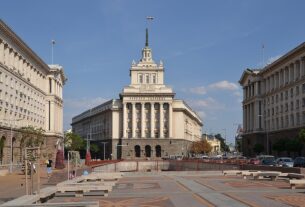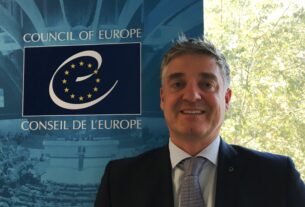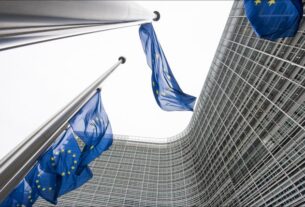In the existing challenges for Serbia’s progress in the accession negotiations with the European Union, the biggest of which is currently harmonization with The Common Foreign and Security Policy (CFSP), it is hard to believe that by the end of this year could happen some sudden turn that would bind Serbia more firmly to the EU.
This is the conclusion of experts on European integration discussing for European Western Balkans the chances for Serbia to make some visible progress on its European path by the end of 2022. After there were no positive results at the June summit of the leaders of the EU member states and the countries of the Western Balkans, Serbia could only hope for a different outcome at the upcoming summit which should be held in December.
A tangible next step for positive developments in European integration should be the opening of Cluster Three in the negotiation process, which is related to “Competitiveness and inclusive growth”.
Even if Serbia is ready to fulfill its part of its obligations in this area, the wider political context leaves no room for the belief that all EU member states will give it the green light, our interlocutors indicate.
As no good news is expected from the EU’s enlargement policy for Serbia at the moment, the “straw of salvation”, i.e., a clearer determination of the EU itself as to whether it wants to strengthen ties with the region, could already be obtained at the October meeting of the new format – the European Political Community.
Waiting for the green light for Cluster Three
In June of this year, Serbia did not receive the green light to open Cluster Three, which includes chapters: Information Society and Media (10), Taxation (16), Economic and Monetary Policy (17), Social Policy and Employment (19), Entrepreneurship and Industrial politics (20), Science and Research (25), Education and Culture (26) and Customs Union (29).
The reason for this was insufficient compliance of Serbia with the Common Foreign and Security Policy of the EU, points out Suzana Grubješić, vice president of the Center for Foreign Policy.
“The same reason could also apply in December, if the new government is not willing to increase the compliance percentage,” Grubješić warns.
The other two criteria for progress in the negotiations, as indicated by Grubješić, are already known – the rule of law and dialogue with Pristina.
“In the best-case scenario, visible progress in all three areas would certainly contribute to speeding up the process, but it is certain that due to the war in Ukraine and Russian aggression, alignment with the Common Foreign and Security Policy of the EU currently represents the biggest challenge for Serbia, primarily due to the direct connection with solving of the Kosovo issue,” she emphasized.
Strahinja Subotić, a senior researcher at the Center for European Policies, points out for EWB that the domestic negotiating team did work on fulfilling the conditions for opening cluster three, but the accession process, as Subotić reminds, does not only mean compliance with EU legal regulations but also actions on both the domestic and external political plan which are following the values represented by the EU.
“In this respect, Serbia may have Cluster Three ready because it has already opened certain chapters in that cluster and worked on negotiating positions for other chapters. It is clear, however, that the second part will gain more importance, namely the European values. On the domestic level that means the rule of law, on the regional level they are reflected in the form of dialogue with Pristina, and finally on the wider European level they are now represented in the form of the sanctions against Russia”, he emphasizes.
Serbia must be the first to show a sign of goodwill
At this moment, the acceleration of the dialogue with Pristina has gained special political importance, as Subotić points out, because if there is no progress on that front – the status quo opens space for negative consequences, both on the lives of citizens and on regional stability, which is an important issue from the EU’s point of view.
He adds that, just as the issue of identity cards for Kosovo citizens has been resolved, the EU will continue to insist on harmonizing Serbia with the EU’s foreign policy regarding Russia, which is something that “the member states cannot forget”, emphasizes Subotić.
“If Serbia does not want to fully adopt all the sanctions packages, it would have to “at least” gradually harmonize with the packages by the end of the year, and that would mean a positive message. The EU expects that Serbia will take those steps when it forms a new government and that there will be no more room for any excuses. If we do not show that sign of goodwill, I see no reason why the member states would unanimously decide to open Cluster Three to Serbia,” he stressed.
Subotić concludes that he is “pessimistic” regarding the possible progress of Serbia towards the EU in the next six months and that there is no good forecast, but also that “politicians show the ability to sometimes surprise us, as was the surprise of giving in to Kosovo’s requests for ID cards”, with pressure from the EU and USA on that plan.
“Whether the opening of the cluster happens or not, the negotiations will certainly continue. Serbia can meet technical criteria, regulations, requirements in certain chapters, but from the political side, this will not be perpetuated by opening clusters and closing chapters. Despite the fact that the EU cannot be unanimous in awarding Serbia, this does not in any way prevent Serbia from continuing to deepen its reforms,” Subotić said.
Stuck in European ambitions
Before the current challenges, Serbia had a two-year standstill in the process of European integration, until mid-December 2021, when, according to the new enlargement methodology, Cluster Four was opened at the Intergovernmental Conference in Brussels. It includes four chapters: Transport Policy (14), Energy ( 15), Trans-European Networks (21) and Environment and Climate Change (27).
Jelica Minić, president of the European Movement in Serbia, told EWB that during almost eight years of Serbia’s accession negotiations with the European Union, 22 of the 35 planned chapters were opened, that is, on average, less than three per year.
“The process itself took place slowly, with an acceleration at the beginning and a slowdown and a standstill until the very end of last year,” she recalls.
A particularly complicated situation in Serbia’s relations with the EU arose with the beginning of Russian aggression against Ukraine and as a result of Serbia’s refusal, as the only country in Europe, to impose sanctions on Russia, Minić reminds. In addition, a solution for normalization of relations with Kosovo is nowhere in sight. The new Government of Serbia has not yet been formed, so no minister has been appointed to lead the negotiations, and the once very capable and well-trained negotiating team in the Serbian administration is, as she assesses, drastically falling apart.
“Therefore, it is not surprising that the European Commission’s reports on Serbia’s progress in the enlargement process are increasingly harsh and critical, especially regarding the rule of law, media freedom, and the development of democratic relations and institutions, as well as joining the EU’s foreign policy positions. One gets the impression that Serbia is completely stuck in its European ambitions, becoming more and more like the “eternal candidate” Turkey”, warns our interlocutor.
That is why, in her opinion, there have already been requests in the European Parliament to freeze the negotiations with Serbia, and it is especially worrying that it is not a “transition” that is visible only on the internal level.
“Serbia is positioning itself on a kind of Hungary-Turkey “axis” in terms of foreign policy and economy, and not only according to a quasi-democratic model, ignoring and endangering not only relations with the EU, but also its long-term and until now unquestionable historical ties with neighboring Romania and Greece”, Minić points out.
She adds that Serbia, in its relations with its neighbors, is doing everything to “thwart” the European path of Montenegro, Bosnia, and Herzegovina, and Kosovo. On the other hand, it is persistently strengthening ties with Russia and China, which is why it does not look like a country that is sincerely on the European path.
“It is hard to believe in some sudden turn that would tie Serbia more tightly to the EU, and especially that it could happen by the end of this year. The biggest damage to Serbia’s approach to the EU, in addition to the aforementioned, is caused by the systematic anti-European propaganda of the authorities in Serbia, which creates a social climate in which an obedient nationalist, right-wing majority, ignores the fact that the majority of trade, investments, and technology transfers come from the EU, and that young, creative and able-bodied citizens of Serbia are voting with their feet for the EU, leaving this aging, weak, devastated and polluted country in every way,” she emphasizes.
Next step: European political community
The negotiation process, the methodology, as well as the formats of the talks, have changed many times so far, delaying the admission of the countries of the Western Balkans to the EU so they could resolve their mutual relations, points out Jelica Minić.
“The EU did not help them enough and honestly. She left them to cook in their own pot, so both internal processes and external alliances, after the initial enthusiasm, moved further and further away from the EU, some across the ocean, some to the East,” she emphasizes.
Minić adds that, perhaps, the current situation in the world and the “shadow” of an unimaginably cruel war in Europe may influence such relations to change, and the upcoming first meeting within the framework of the “European Political Community”, a new initiative for the gathering of states, may serve this purpose.
Initiated by the French President Emmanuel Macron, supported by the President of the European Council, Charles Michel, and whose format and function have yet to be crystallized.
“Perhaps the upcoming October meeting of the European political community, which precisely defines the European orbit and offers various levels and sectors of tighter integration, will lead to a clearer answer to the question of what Europe wants. Because, in addition to the Western Balkans, Great Britain, Turkey, Norway, Switzerland, Iceland, Liechtenstein, Ukraine, Moldova, Georgia, Armenia, and Azerbaijan are in that orbit. If there is an appropriate common vision, first of all of the geostrategic future of Europe, the motherland will pull us to participate in it, whether we like it or not,” she concludes.
The post Slim chance for Serbia’s progress towards the EU by the end of the year, relationship with Russia remains the biggest problem appeared first on European Western Balkans.





